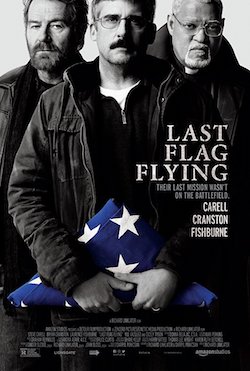Last Flag Flying is a stellar film based on a novel by a Bainbridge Island author
If you haven't seen the 1973 Hal Ashby film The Last Detail, I'd urge you to do so. Detail, starring Jack Nicholson, Otis Young, and Randy Quaid as young Navy men on a road trip before one of them is put in the brig for a long time, is one of the most quintessentially American films I think I've ever seen. It's an ambitious, dark, funny film that name-checks Billy Budd and questions our assumptions about freedom and duty.

Richard Linklater's new film Last Flag Flying is a spiritual sequel to Detail, but it's not a direct sequel. Both films are based on novels written by Bainbridge Island author Darryl Ponicsan (Ponicsan co-authored the screenplay for Flag with Linklater,) and both feature three military men on a road trip. But the men in Flag are Marines, not Navy; the names of the characters are different; and the timelines of the films don't quite line up evenly. Still, Flag picks up the spiritual threads of Detail and spins them out into a story that's a little wiser, a little slower, and a little bit more disillusioned than the 1973 film.
Steve Carell's Larry Shepherd is the Quaid character, the younger innocent who sets the plot in motion. Laurence Fishburne plays Richard Mueller, a former hellraiser who has turned to Jesus and now lives as a reverend. And Bryan Cranston absolutely slays as Sal Nealon, the rabble-rousing smartass who nevertheless misses the time he spent in the Marines. (One relatively unknown actor, J. Quinton Johnson, plays a supporting role as a young Marine assigned to the three older men; Johnson more than carries his weight with these great actors, here. I expect to see more great things from him in the very near future.)
Cranston is playing the Nicholson role here, and it's a knockout performance. He's a huge dick — an alcoholic asshole who loudly tells you how horrible he is and then immediately demonstrates that he was telling the truth all along — but there's something so lovable about his bombast that you can't ever quite turn your back on him. Cranston builds on Nicholson's performance in Detail by making his character a stand-in for American weariness. He notes that America doesn't build anything anymore. He has disparaging words for the Iraq War — the film is set in 2003 — and he laments a simpler time when men were men. His nostalgia is wrong-headed, but his sadness is real and raw and very relatable.
Flag is a very talky, slow-paced film. It doesn't have the cathartic youthful vigor of Detail. These are three older men who've been beaten down by life and duty and the death of their dreams, and anyone expecting a wild dance party that fixes everything is likely in the wrong theater. But if you have a taste for slow and talky films, you might not find a better one this year. The writing and pacing of Flag is exquisite, and the questions it raises about belief and friendship and honor are piercing.
And while Flag will inevitably be compared with Detail, there's another film in theaters right now that deserves mention, too. Greta Gerwig's directorial debut, Lady Bird, is also set (partially) in 2003, and Lady Bird and Flag would make for a stellar weekend double-feature. Both films wrestle with the American response to 9/11 and the beginning of the end of our imperial authority as a nation. Both films capture a moment before technology consumed every waking moment of our attention. And both films depict very different moments in the ongoing conversation between individual and society.
Nearly 15 years later, we're just starting to realize what it is we lost as a nation, and how we lost it. Small, funny, brilliant films like Lady Bird and Last Flag Flying are a big part of how we'll finally be able to understand what happened to us.